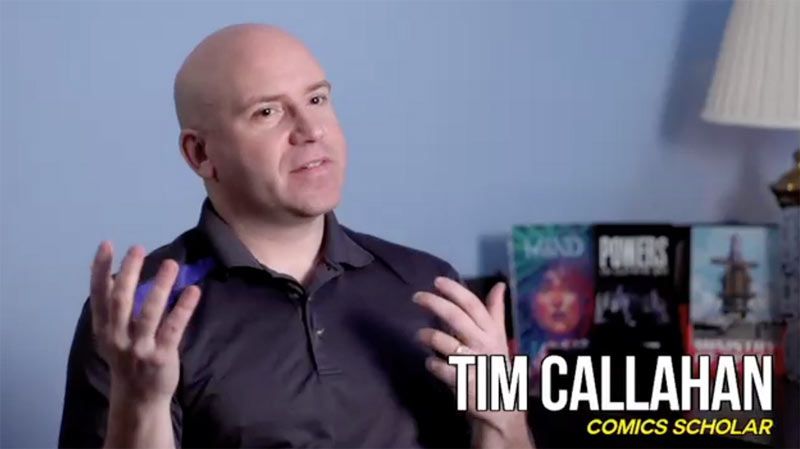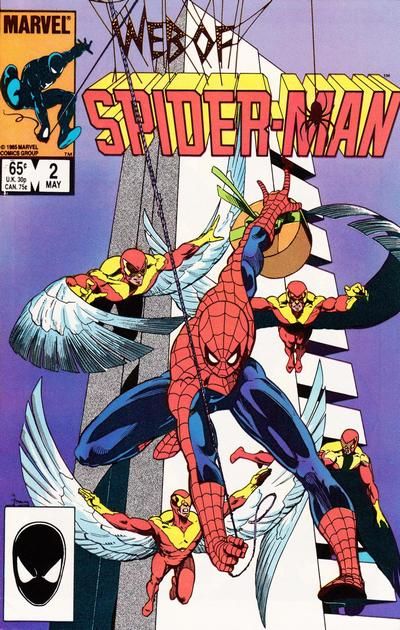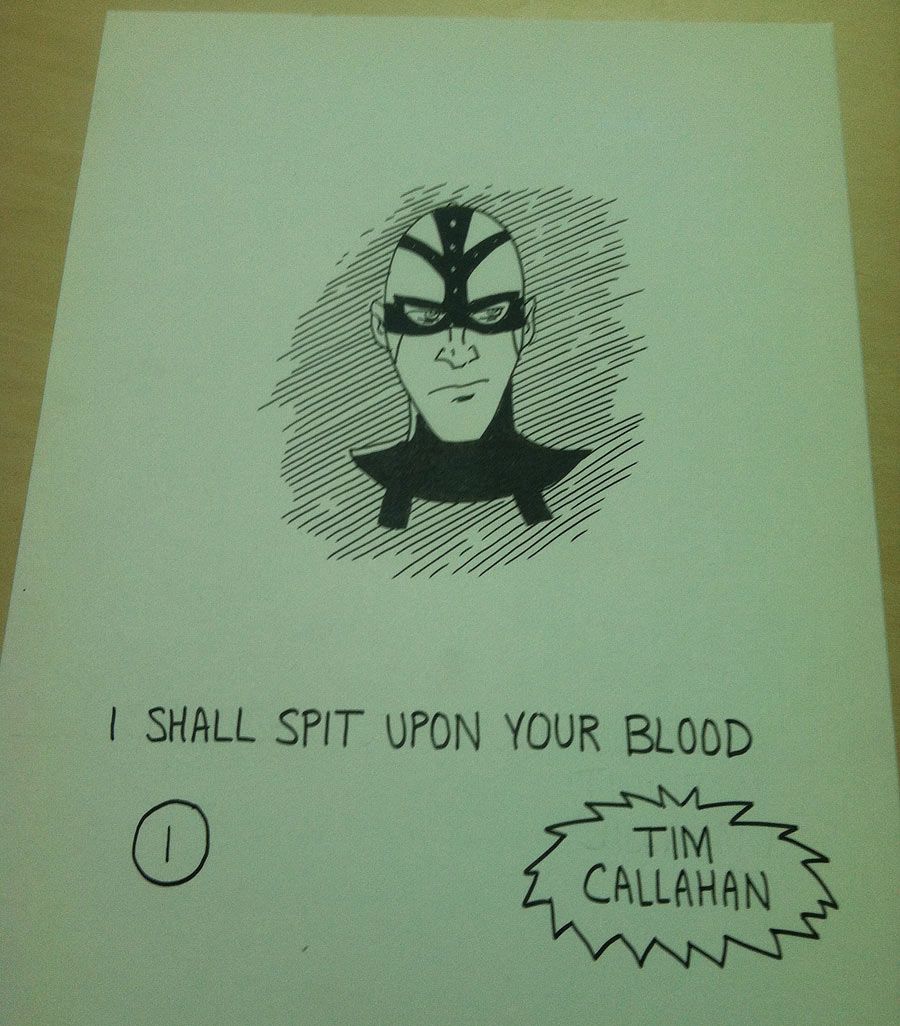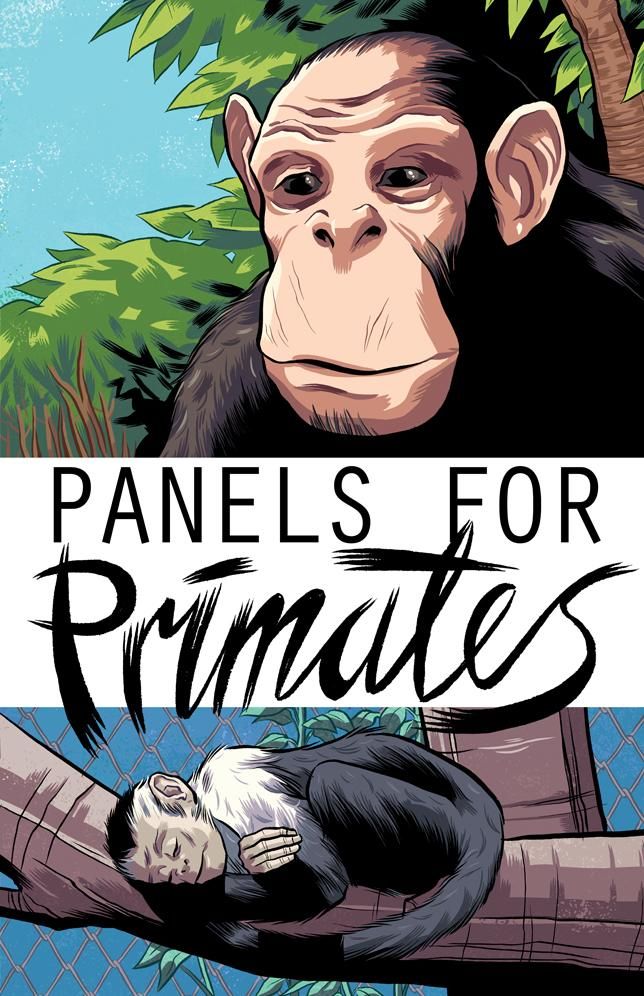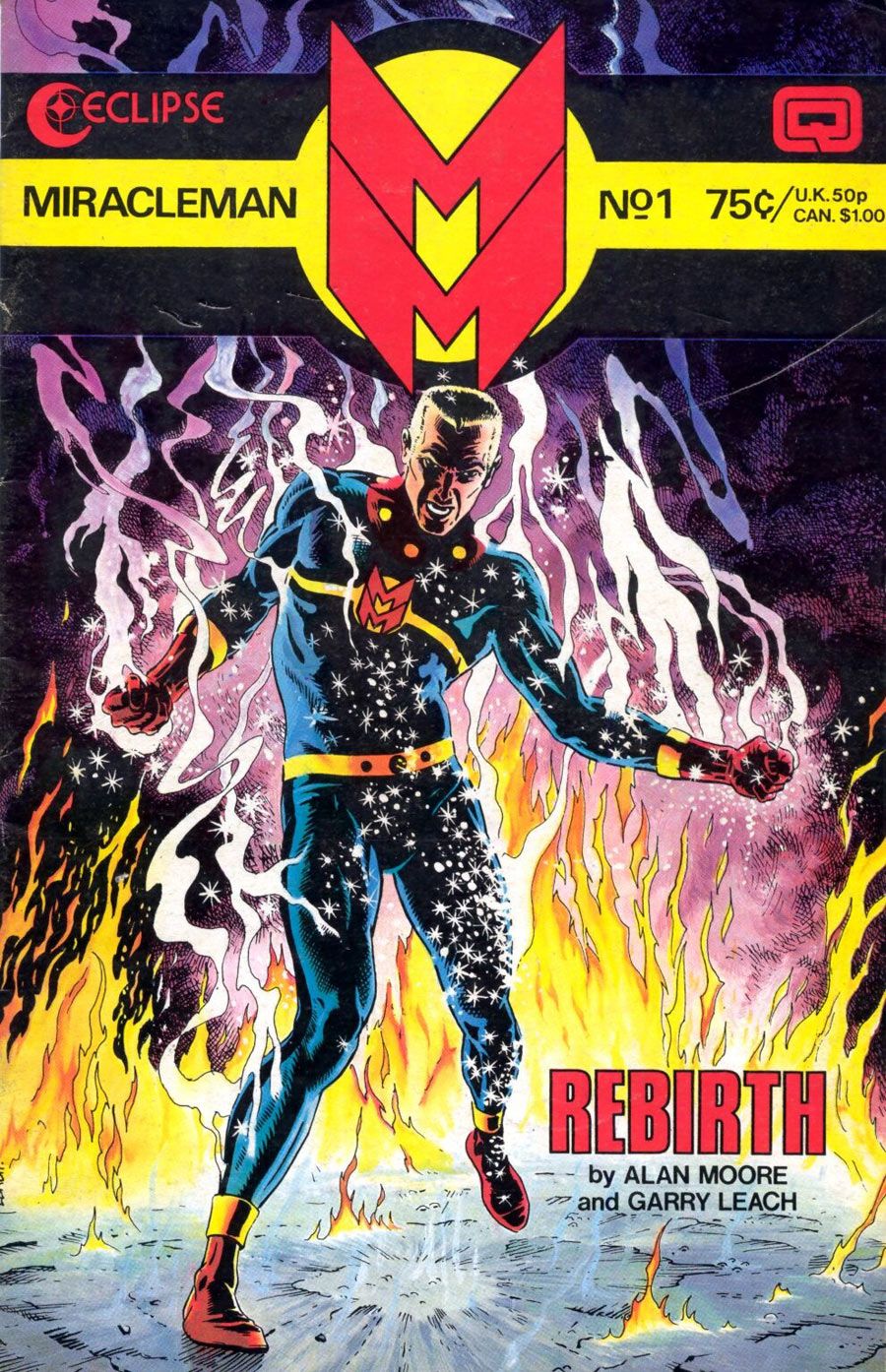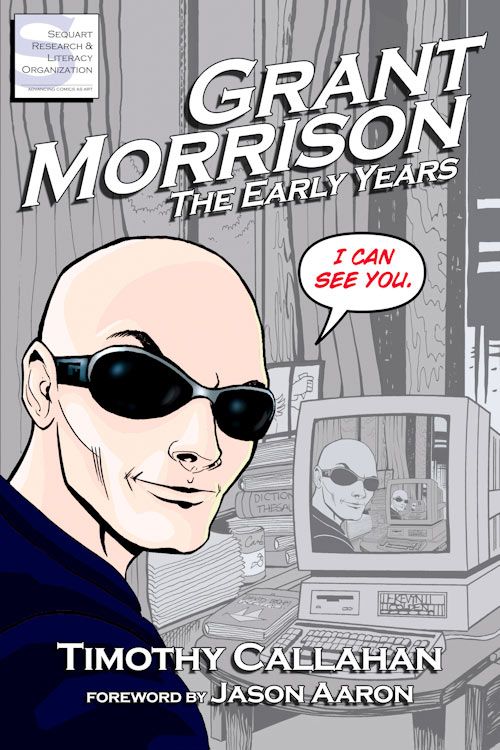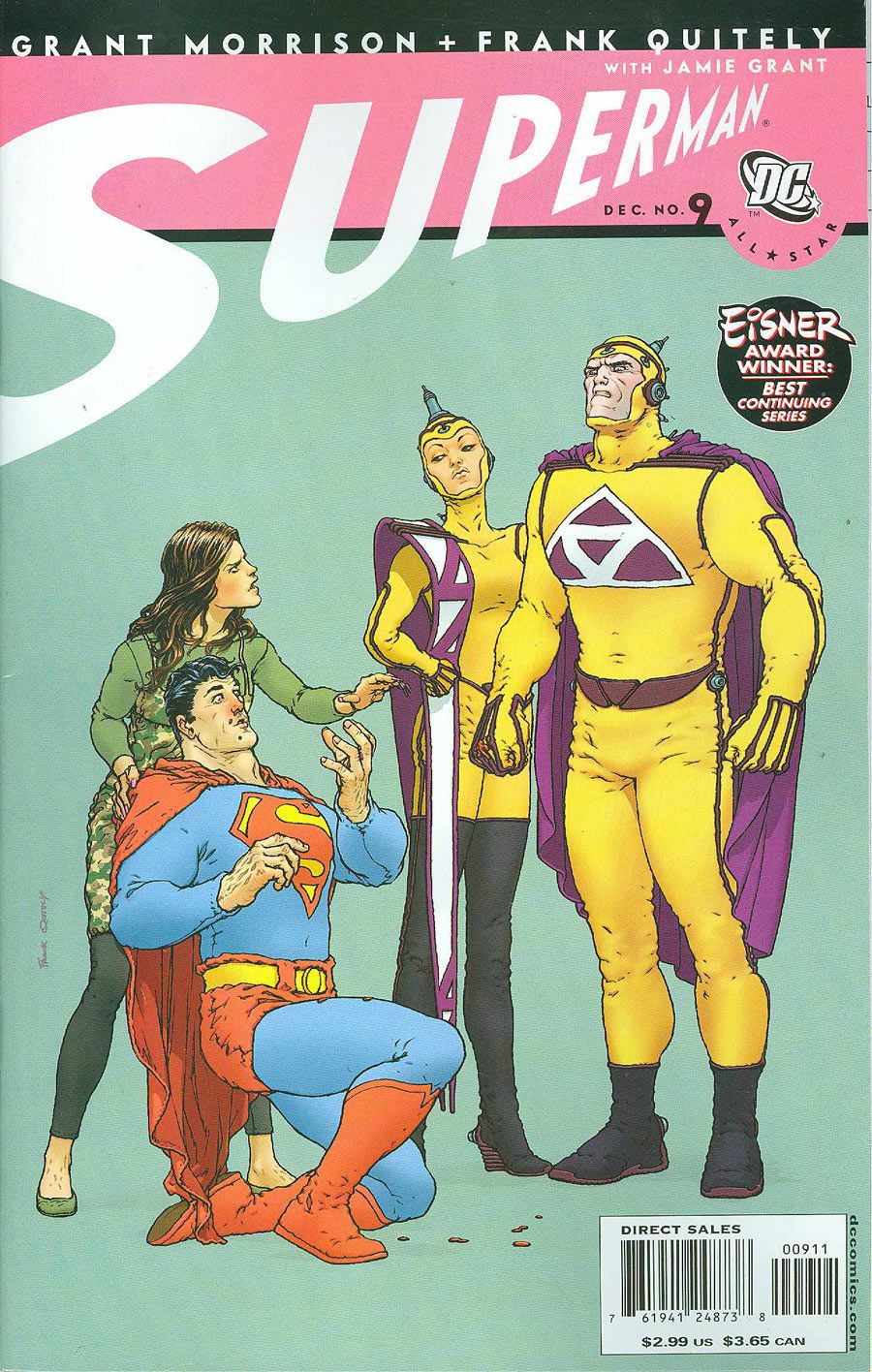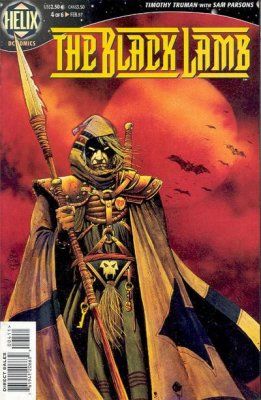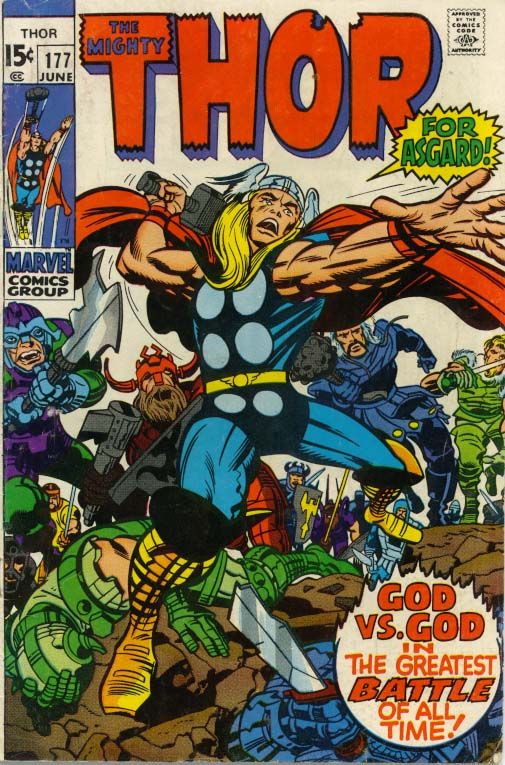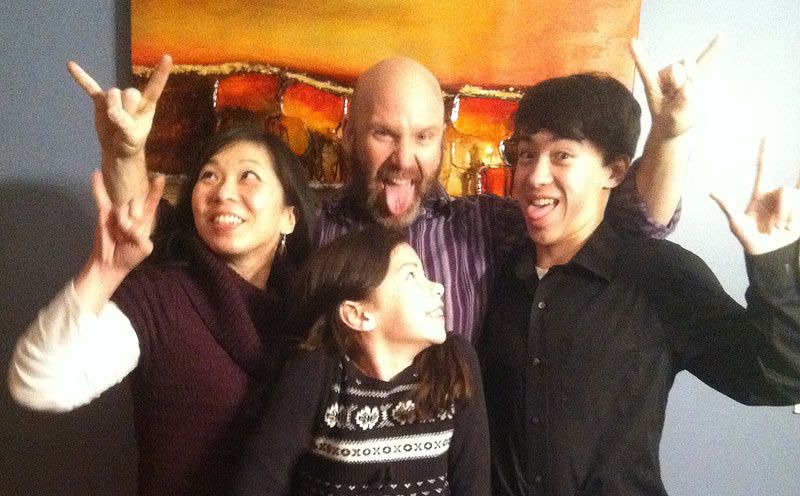THE LAST WHEN WORDS COLLIDE COLUMN: THE EXIT INTERVIEW
After over five years of weekly WHEN WORDS COLLIDE columns, this is it.
The last one.
I didn't really know how to say everything I needed to say about bringing this column to a close, so I brought in my longtime-and-mostly-retired colleague Chad Nevett to conduct an exit interview with me. I figured he could get some answers out of me. And he did.
Chad Nevett: So, this is the end. Your final WHEN WORDS COLLIDE column. When you announced on Twitter that the column was ending, I was not surprised in the least. Actually, I would be surprised if anyone who's been paying attention for the past couple of years is surprised. You seem to have retreated from comics to a large degree over time. The love is still there for specific books, but there isn't the same all-consuming love that seemed to have led to the start of the "Splash Page" or "When Words Collide." Does that seem accurate, or am I overstating things a bit?
Tim Callahan: It's hard to recapture that feeling of six-plus years ago when you and I kicked off that first Splash Page discussion on the ol' Sequart website, but if I jump back into my Geniusboy Firemelon blog archives and look at the stuff I posted during the previous year, when I started writing about comics "seriously," what I find is a pretty eclectic blend of stuff. If we just look at September of 2006, the month when I really kicked up my output on that blog with a whopping 17 entries, I have a bunch of posts featuring my sketches and doodles, a movie review, a TV review, brief discussions of a Nabokov novel and the Becky Cloonan "Dracula" adaptation, a statement about how much I love Frank Miller comics, a look at the art of Steve Yeowell and a bunch of graded capsule reviews of superhero comic books with highlights like Kurt Busiek's "Action Comics" (grade: A) and Reggie Hudlin's "Black Panther" (grade: D).
In some ways, I feel like I'm back in that mindset again after a pretty intense trip inside the guts of comics, and in other ways, I feel like some of those old opinions belong to another guy entirely.
But what's notable, looking back on the blog posts early on in my writing-about-comics career is that comics were just one of the things I was interested in. Not the all-consuming thing that it kind of became by, say, 2008 or 2009.
So I don't think it's quite true to say that my obsession with comics led to the "Splash Page" and "When Words Collide." It's more accurate to say that once I started writing about comics, and other avenues opened up -- like, most notably, the relaunched CBR with me as a founding member of the review team and a weekly columnist later that same summer -- I started to feel like I needed to read all the comics. I felt a responsibility to be an expert on everything in the industry and read all of it, from the crappiest superhero comics to whatever was new from Drawn & Quarterly to other blogs about comics to Les Daniels' pop-culture history lessons to the print version of Comics Comics to what Ivan Brandon said on some message board somewhere.
And I loved playing that role of "the guy who read everything," and, firmly entrenched in the mainstream-focused CBR, I was buying 30-40 superhero-ish comics every week, plus ordering all the Marvel Masterworks and DC Archives and trying to keep up with Fantagraphics and D&Q and Oni and, later, PictureBox and...yeah, it would bother me if a comic came out and I saw a mention of it, and I hadn't yet read it. There was no way to keep up and read every single thing, but I felt like I wanted to be someone who read more of it than anyone. And I mean that literally. I wanted to win the nonexistent gold medal for "read the most comics from all the publishers" and has opinions about them. And I was trying to do this in a world in which Douglas Wolk exists.
But even at the height of that, I had the feeling -- which I expressed -- that a lot of this stuff wasn't actually very good. There were some great books and some great runs on some shlocky properties and I really enjoyed that stretch of time that gave us "Final Crisis" to debate and "Batman R.I.P." to ponder and "Scalped" hitting its stride and Matt Fraction blasting to Marvel prominence and Jonathan Lethem and Farel Dalrymple's "Omega the Unknown" and my coverage of San Diego Comic-Con as a CBR reporter, and "Umbrella Academy," and my first articles for "Back Issue Magazine." But that was four or five years ago.
And I think my enthusiasm has been on a gradual decline since.
Or, at least, my enthusiasm for trying to keep up with everything, and my enthusiasm for trying to say something about them that isn't a rehash of other things I've already said. I'm okay not reading most comics. I'm letting it go that I don't know what Zeb Wells is writing at this point or which artist is drawing "Detective Comics" next month. I don't care at all. I used to care. I felt like it was my job to care.
Now, I read what I want, when I want -- which seems weird to even say as some kind of declaration, but there was a time not too long ago when I felt compelled to read stuff I didn't want to when I didn't really feel like it -- and that newfound freedom has led to less comics-reading than I would have imagined. I'd rather read a cheesy Edgar Rice Burroughs novel, instead, or that Jim Henson biography that I wrote about last month, or those twenty role-playing game books that I bought because now I'm running a bunch of games for my kids and my friends. I feel like Chris Cooper in that scene in "Adaptation" where he says, "done with fish."
Although, that's not even totally true, because to finish out this year, and do my Best of 2013 list justice, I read about a hundred and fifty different comics just in the past month so I wouldn't feel like a fraud declaring a Top 10. Yeah, old habits.
I really get where you're coming from. It's always felt a little weird to be so focused on comics when, like you, my own interests are much more broad. Comics are something that dominate my Wednesday evening and get read here and there throughout the week, but the rest of the time is filled with a variety of other interests, few of which I devote nearly as much time to (or, devoted as much time to). After a while, it's hard not to wonder why you're spending so much time on this one specific thing when there's so much more that you enjoy.
And, more than that, I imagine you enjoy those other things in a different manner than you've "enjoyed" comics in the past. There isn't a pressure to know every TV show or movie or novel or play or album or anything. But, with comics, it's based in a weird game of keeping up with everything. I remember when the "Spawn" movie came out and, somehow, before seeing it, I knew the entire story without ever reading a single issue of the comic. And that seems normal to a strange degree in comics.

However, coming from an academic background, did you ever see comics as merely a specialization of a sort? Some people specialize in Restoration English Literature or Modernist fiction, but you specialized in comics. After spending so many years in this area, is there part of you that's apprehensive about stepping away from it?
Yes. Bet let me jump back to your earlier point: I have been equally obsessive about other media in the past. When I used to teach my cinema class, I felt like I had to watch every movie, and I still have my 2000-plus, basically worthless DVD collection in the basement. And when I knew I was going to become an English Lit major, and up through my first half-dozen years as an English teacher, I read fiction obsessively. I didn't want to not know the work of any author someone happened to mention.
So I do think it's a personality trait, but it is one particularly suited to comics, where the obsessives come out to play each Wednesday. Then return home to their hoard.
But to get back to your question about specialization -- yeah, I did start to think of myself, particularly once I wrote the Morrison book, as some kind of comic book scholar, a Literature guy specializing in graphic narrative. And, around that same time, I was paid a pretty decent amount to lecture as a comics scholar at some places like the Norman Rockwell Museum and various regional library associations. You can recognize that part of my career because my blog posts from that era use the word "canon" more than I ever have since.
I can imagine an alternate timeline where I went back for additional graduate work in literature and specialized in comics in an academic setting, but I was teaching full time with a wife and two kids, so pursuing the academic angle wasn't something I was willing to sacrifice everything else to achieve. Plus, there was this: I think I'm a decent writer, and I think I'm even better as a public speaker, but I'm a terrible academic. I am not particularly detail-oriented when it comes to research and I can't get past the self-seriousness of academic writing or my image of "academic life." I don't really know if I can articulate it, but, for example, right now, I'm on the advisory board for the Liberal Arts program of our local community college, playing the role of, "here's what's going on in secondary education these days," and even there, so much of what is discussed about college life and academic concerns strikes me as some middle-class fantasy of what leisure time in Regency England was like. I can't buy into the myth that lecturing about the semiotics of "Rusty Brown" has any real value, you know?

That may seem disingenuous coming from a guy who analyzed mimesis in a Darwyn Cooke's "New Talent Showcase" story, but I can do that stuff once in a while to amuse myself. But to lecture about that stuff in front of kids paying thousands of dollars for it? Or even to write a book entirely at that level of bellybutton-study? Yeah, that's not for me.
And yet, I am apprehensive about stepping away from comics in the sense that as much as I say I don't care what Zeb Wells is writing or who is drawing "Detective Comics," a part of me wants to go look that up right now and find out. I do feel a void in not knowing everything about comics, but I am hoping that it will pass. I don't feel the need to watch every movie or read every novel any more. I have moved on. But comics has been a longer love affair, so I can't imagine that I'll stop reading comics entirely. It's been a major interest of mine since I first picked up "Web of Spider-Man" #2, if not before. Certainly "Ambush Bug" #3 sealed the deal, and I can't violate that sacred covenant by turning my back on the medium.
See, this whole "write about comics and make money" thing is something you managed to figure out while it has almost completely eluded me. It sounds a little crass, but was it learning that that made you focus on writing about comics so much? Or was that just a nice bonus when the desire was already there? What made you write about comics -- and begin this column as a result? (And, yes, you can just say, "I did it for the money." No one will judge. Well, I won't judge...)
I wrote a lot about comics before I started making any money at it, between my blog and the Sequart site and the Morrison book. Though the latter ended up making me a couple of thousand dollars on the back end, the bulk of that work was written as blog posts for zero dollars with no guarantee of anything. I had the notion that it would become as book, but I didn't know if that would definitely happen or if anyone would actually buy it. It turns out some people did, and I thank them for that, since that book was basically the foundation of my entire career.
So I would say the making-money part didn't have anything to do with why I started writing about comics, but it did have something to do with why comics became my primary focus, I'm sure. I started writing about comics because I thought I had something to say about them. I had opinions and I didn't see a lot of intelligent writing about a lot of the comics I thought were worth reading, and I didn't see a lot of smart criticism about the bad ones, either. And when I did see it, I wanted to be part of it.
Of course, the simple answer as to why I started WHEN WORDS COLLIDE five-and-a-half years ago is that Jonah Weiland emailed me out of the blue saying that he liked my writing and wondered if I'd want to be part of the new CBR crew and write reviews and maybe a column and I said, "Yes, please." The hardest part of that decision was trying to come up with a name for the column, which, even after all these years, people still think is called WHEN WORLDS COLLIDE, and I'm here to say that those people are nice people, but they are wrong. Reconsider your perspective on life, because there is no "L."
Anyway, when I say that the money encouraged comics as my primary focus, it's because I was getting paid to write about comics, but no one was willing to pay me to write or draw my own comics -- which is something I'd always planned on doing -- and no one was willing to pay me to write about anything but comics. So as the years went on, it became a matter of, "Well, I have two or three hours I can devote to writing today, so do I write two pieces about comics and make $50 or $100 from CBR or Comics Alliance or Tor, or do I write a blog post about that Duncan Jones movie I liked or work on rewriting that comic book script that no one was interested in reading?" It was hard to justify the non-paying stuff, even though it's not like I was desperate for the cash. My wife and I both have steady jobs and can pay our bills with our regular salaries, so all of the writing-about-comics was just extra money for me to buy more comics to write about. And while that sounds great in theory, it didn't really work to my benefit the way I handled things.
To put some math on the table, if I was buying 30 comics a week, at, let's say, $3 each, and buying basically every notable graphic novel release along with various collected editions and books-about-comics, that was averaging about $800 per month in expenses (not including trips to conventions, which could run $2000 for a long weekend between travel and hotels and meals and purchasing-stuff-that-caught my eye). And that was what I felt compelled to spend to stay current as an "expert." So even if I was getting some royalties from Sequart book sales and getting a monthly paycheck from CBR for reviews and columns, and an occasional gig at Back Issue Magazine, I still wasn't making that $800 per month through my writing. I could cover maybe 2/3rds of that in a good month. I was losing money by making money writing about comics.
It wasn't until I started working for Tor (on top of everything else) that I actually started to make any "profit" from writing about comics, and that timed with me cutting back on my weekly direct-market buying and also an increased ability for me to reach out to publishers to request review copies so I wouldn't have to spend as much to stay current.
And one of the best perks about writing for Tor was that I was being paid to do things like write an essay about being a father and watching "Finding Nemo" with my son, or writing about the novels that inspired "Dungeons & Dragons." Finally, I was justified, and rewarded, for writing about something other than comics, and it felt good.
But, writing about comics has been enjoyable, of course. Having done it with such focus for all these years, what do you think has changed -- both in comics and your approach to them? I find it interesting that you and I aren't always in sync with our reading, so, on some occasions, I read something you wrote about years ago and get to go back and see what you said. When I finally read the Bendis/Maleev "Daredevil" earlier this year, I did that and mentioned it to you, and you seemed to have no recollection whatsoever about what you wrote. Have you gone back and read much of your older writing to see how you've evolved over the years?
I go back to my older work once in a while, but usually what prompts it is some new mention -- or some new reconsideration -- of something I know I wrote about at some point. The most recent example was when Marvel finally announced the release of "Miracleman," and when all the blogs and news sites started to pop up with "Miracleman" retrospectives and commentaries about the Warrior and Eclipse serials, I was thinking, "Man, I wrote about that already at Tor, when I did my big Alan Moore reread." Then I googled "Callahan Moore Miracleman," so I could Tweet those link to folks who might be interested in what I said about that series over at Tor, and I saw that I had written a bunch of WHEN WORDS COLLIDE columns about "Miracleman" over four years ago, when Marvel originally announced that they had acquired the rights to the series. I totally forgot I wrote a multi-part analysis of the Alan Moore and Neil Gaiman runs as part of this column until I saw that stuff pop up in my search. I sort of remembered writing it once I looked at it, but I didn't remember what I actually wrote. So I reread it and thought that it was still pretty good, and relevant, so I reminded Jonah and the CBR guys about it, since they might want to link back to it this year. And they did.
I wouldn't say that I usually completely forget that I've written about a subject, but it's quite common that I don't remember much of what I actually said about things. The good news is that when I do go back to look at older columns, I still tend to agree with myself. But I think what happens is that I just can't remember if my opinions were expressed via WHEN WORDS COLLIDE, or at other writing venues, or it's just something you and I talked about on a podcast, or it's a conversation I had with someone at a convention. I guess that's what happens when you think about comics all the time -- you don't know where the stuff leaks out of it since you're immersed in the ideas almost nonstop. Or at least, that's what has happened to me.
The other thing that's always in play is that I own all of the pieces I've ever written, with the notable exception of the handful of reviews I wrote for Comics Alliance when they were under the AOL umbrella. And with the columns and articles and essays I own -- easily half a million words worth, but probably a considerable amount more -- I have always assumed I would collect the best stuff and self-publish "The Collected Essays of Tim Callahan" (yeesh, that sounds arrogant) at some point. Or maybe some shorter, thematic collections, like "Here's Tim Callahan on Superman and Batman" or "Here's Tim Callahan Writing Negative Reviews That Hurt People's Feelings" or "Tim Callahan Likes Grant Morrison, In Case You Didn't Notice." I don't know if there's an audience for anything of the sort, but occasionally, someone will ask me about that kind of thing, and I just say, "Yeah, probably, eventually." And that thought drives me back to look at some of my older work and put together a fantasy line-up of the best stuff I've written. Or the stuff I think might sell some books. But I lose interest after about 15 minutes of doing that, which is probably not a good sign if you're expecting a collection of my columns any time soon.
Just to jump back to your initial assumption in your question: Yes, writing about comics has been enjoyable. I still enjoy writing about comics, it's just harder and harder to get started and to care enough about a topic to sit down and write about it. But once I start typing, I write things that amuse myself, anyway, so it's always fun while it lasts. And once it's over, I think, "Oh man, I should just start writing next week's column right now! I'm all jacked up on comics!" But I don't, and then a week goes by and it's 11:00 PM on Sunday night and my column is due before Monday and I wonder what I'm going to write about and if I have anything left to say about comics.
Are there things you think you have left to say? While you may not be interested in doing a weekly column, I assume there are topics you would still like to explore and write about. Perhaps even large enough topics to warrant a book-length analysis. You've mentioned a few things you've been working on to me from time to time, but is there any "dream project" you'd like to attempt?
Short answer: Not really, but sort of. I was supposed to have been working on a book about the comics industry in the 1990s, but I was never able to get going on that. I'm interested in that era -- a lot -- but I never really got past the research stage and some initial writing on 1990 (some of which was then cannibalized for one of my recent Frank Miller columns), and with the health issues I had over the past year, and the way that really screwed up my summer months, which could have been dedicated to making a dent in the 1990s project, I realized I wasn't going to be able to meet the deadline for that book, and so I stepped away from it. I should have walked away earlier, had I been more realistic with myself. I'm glad I did abandon that project, though, because it was a constant source of anxiety for me -- every day that I didn't inch forward on the 1990s book was a day that I felt like a kid who didn't do his homework for school the next day, and he was running out of time to get caught up.
So I guess I would like to do something about that era of comics history, eventually, but more of an analysis then a straight history thing.
I'd also planned on a whole series of columns exploring DC's short-lived Helix imprint, but as you might recall, I ended up writing a grand total of one column on the topic and never went back to it. I own all the Helix comics, and I'd like to do something with them -- or maybe sci-fi comics in general -- at some point, but I just lost steam on that. So, again, maybe that's a sign that it's not really worth doing. We'll see if I ever revive my interest in it.
Ultimately, I think the situation is this: I have been fascinated with analyzing comics, and evaluating their relative quality (which is one of the reasons I love doing lists, and it's not just because they are easy to do), but that's always been in the service of a larger goal, which was to better understand comics so I'd be better at making my own. If you retrace my life paths, a lot of decisions I have made have been in terms of, "What steps can I take to become more of an expert about making good comics?" I started pitching to Marvel and DC when I was in high school. I applied to Dark Horse editorial when I was finishing up college, and they invited me to come out for an interview, but I decided to stay in the Northeast, so I never followed up on that.
The whole reason I majored in English was because I wanted to be a comic book writer, and that seemed like the way to get a more well-balanced perspective on the literary side of things. Before I started working at CBR, I'd already had pitches out to Top Shelf and First Second and other places. But then the CBR stuff kind of took my career in a completely different direction. I lost the drive to make my own comics, yet I still wanted to analyze the medium to see what worked and what didn't. But if I wasn't doing that to improve my own comics-making, what was the point? I kind of lost my original purpose, you might say.
I'd go back to the creative stuff once in a while and try to fire up some old projects or connect with other folks to collaborate with -- I mean, I do have a piece in that "Panels for Primates" anthology that Monkeybrain recently released, though that was written like four years ago -- but the amount of work it takes to get a project going and the amount of -- not rejection, but apathy you get just makes it all feel pointless. It's not even frustrating, it's just -- nothing. That's why the best advice everyone ever gives about "breaking into comics" is just a simple "Make comics, and don't give up." Because that's all you can do. Many of the people making comics should have given up long ago, if they had any sense, and it's just their stubborn persistence that gets them to the point where some of their work becomes publishable and they can make a reasonable living.
I have a more than full-time career as an educator already, though, and that's completely satisfying. I don't need to kill myself to try to get some comics in front of a tiny audience. That seems like a weird thing to want to do. I guess I wanted to do it not that long ago, but I think probably that was just an ego thing. I've moved beyond that. Or, at least I think I have.
What I haven't moved beyond is the creative act itself. I have just channeled my world-building and character creation and goofy drawings into all the role-playing game stuff I've been doing lately. I can produce thousands of words of that stuff in a single sitting, and it's incredibly rewarding to create game material, even if it's just for a small group, and then get immediate feedback via their enjoyment of the game. I suppose even that will get stale, too, if it's my primary focus, but I'm willing to do a lot of writing in that arena without any money coming my way -- I'm even starting an old-fashioned zine in January based on doing Dungeon Crawl Classics type stuff in Edgar Rice Burroughs' version of outer space adventure, and I'm churning out material for that -- and doing it for my own enjoyment, knowing it will not bring in any money, makes it seem more pure. And it's clearly something I love doing, or I wouldn't be doing it. We'll see how I feel if I ever start getting paid for that stuff. Then I'm probably back where I started, and I'll be asking you to do another exit interview with me at some RPG site five years from now.
Considering my sum knowledge of RPGs are the five or six times I've played them with you and some others online, I imagine that interview would be much, much worse.
Since you brought it up, I have been wondering how your heart attack might have changed your desire to write about comics. I know we did a couple of podcasts after that happened, and you seemed like your usual self, but has there been a change? When I stepped away from writing about comics earlier in the year, that decision was influenced heavily by my personal life changing. I got married a few months earlier, and literally, the day before the Blogathon, we found out that we were having a baby. I had already made my decision by the time that happened, but knowing that I would be starting a family and not wanting to spend time on things that weren't making me happy made it really easy to see that I didn't want to continue doing what I was doing. Did the heart attack have a similar impact -- not necessarily immediately, but even over the past six months as you've recovered and gotten back into your normal routine?
Yeah, the old heart-attack. That was some fun times.
Since I've never actually talked about that event in this column, let me give a little summary for everyone who has no idea what you're talking about: In May of 2013, I was kicking the soccer ball around with my daughter in the back yard, three days before my 41st birthday, and I didn't feel well. I felt really out of shape, even though I wasn't actually out of shape. I wasn't particularly overweight, though I could have lost a few pounds, sure, but I had never had high blood pressure or high cholesterol or any of that. Anyway, I felt winded and light-headed, and I knew we were headed to NYC that weekend to do a lot of walking around, so I decided to drive myself to the emergency room just so they could rule everything out and just tell me what they'd been telling me for the past year-and-a-half: I had anxiety issues and everything was physically fine.

Right. Turns out, it was a heart attack, or several small heart attacks, and I had two blockages in my arteries. The doctor said I would have had a massive heart attack if I hadn't been exercising by playing ultimate frisbee pretty regularly, which kept blood pumping to my heart via all the capillaries that had been created through that kind of athletic activity. Because zero blood was getting to my heart via one of the main arteries, and that usually means really bad stuff.
So, yeah, it turned out to be just a weird genetic thing, and once they went in and did the surgery and removed the blockages, I felt better than ever. That thing they had been calling panic disorder for the past 18 months was totally gone. Turns out that it had been a blockage the whole time. The second blockage must have happened in May, and that's what really kicked my ass.
People asked me, and continue to ask me, "Wasn't that scary?" And the thing is, it wasn't. It felt good to know what was wrong and then have it fixed. I'm not glad I had a heart attack, but I'm glad I went to the hospital that night instead of waiting even another day, and I'm glad I had the experience of seeing how things might have turned out differently. I pretty much enjoy life every day, anyway, so it's not like I woke up after surgery and saw how much there was to love about the world all of a sudden.
What really changed, though, was that I needed to recover after the surgery. I missed nearly two weeks of work, and I realized how much I loved my job at the school when I wasn't allowed to go and actually do it. Sitting around for two weeks, not being able to do much other than read and watch television -- that was brutal for me. I thought it would actually be relaxing, or even like a mini-vacation, but knowing that I should have been at school, helping out, taking care of things, and that I wasn't allowed to do that because I needed to sit at home, that was eye-opening for me. I really missed my day job and the sense of purpose that goes with it, and I realized how glad I am that I'm nowhere near retirement, because sitting around like that is horrible. Now, I better understand why my aunt, who is a retired teacher, works basically full-time in her various volunteer jobs. Doing something productive with a sense of purpose is so, so important. It might be what life is all about.
So there's that.
But there's also the rehab and the physical therapy that followed my surgery. That took a lot of my time over the summer, and now I have better-than-ever dietary habits and a more regular workout routine, and all of that takes more time, too. It's great. I feel great, but it takes time.
All of that combines to form a situation where I've had a near death experience, a sense of awareness that my true purpose is more closely aligned with what I do in my day-to-day job, and a restructuring of my "leisure" time to better support my health, so it's logical to assume that comics don't seem like such a priority. I don't know if that's really the way it all worked out, but I do know that one hour per night of writing time was replaced by one hour per night of driving to the gym, working out for 30 minutes, and driving back home. And I do know that during my time after surgery, and even during the summer months, I barely read any comics, even when I was sitting around, recovering, and had time to do so.

Is that because my perspective on life changed? Because the medication I am now on gives me a shorter attention span or keeps my pulse down so I don't get as excited about stuff in general? Because I had a bit less time for reading overall? Because the comics themselves were just not very interesting? All of the above? I don't really know for sure.
But I know comics seemed to matter a lot to me a few years ago, and they matter a whole lot less to me now. There was a time, not too long ago, when I would champion the medium, and as I said, I would literally give lectures on the very topic on what makes comics so great and why you should read them. Now, I feel like saying, "You can read them if you're interested. Or you could do other things. Do whatever you want, you know?"
See, that's the way I've always viewed comics. Since I grew up with a father who read them, they have always been around and seemed normal to me; no different from the TV or books. I've never been able to get in line with the contingent of comics readers who feel the need to champion them, to advocate for them, to beg and grovel for a few words of acceptance from the world at large. It always seemed to me that the best way for comics to be seen as normal is to treat them as such, which is where you seem to be in some ways. Post-advocacy. It's healthy.
We're coming to a close and have pretty much dissected why you're leaving the column from all angles, so let's see if I can ask one of those big Tim Callahan-esque questions: What is the most important comic released during the run of WHEN WORDS COLLIDE?
Most important? I have no idea. None of them are actually important; they are just comics. Is this a trick question to see if I really have gained perspective on all of this? If so, kudos to you, but I did not fall into your trap. (P.S. The secret answer is "All-Star Superman," because it made me feel something.)
It wasn't a trick. I was expecting 2000 words pontificating on how Comic X is the most important book of the last six years and how everyone who has read it has been blessed by the comics gods. Instead, you gave me an answer worthy of... well, me.
Since we're at the end, is this the part where I thank you for your writings, which I've enjoyed almost all of (except for the Geoff Johns praising, of course), and you thank everyone who made this column possible? How about we assume all of that and you speculate on what comics (if any) you'll read first with no obligations to write about, even as an abstract possibility? I tell you, my friend, that's a liberating feeling, relearning to enjoy reading comics for the sake of reading comics.
I don't know, man. I'm pretty sure we settled the Great Geoff Johns debate years ago, when I masterfully demonstrated why "Teen Titans" was as good or better than "Planetary." Wait, did I say that? I don't remember. As you know.
First no-obligation comics? I'd like to get to these 2000 AD collections I have sitting on my shelf. Just plow through a bunch of Judge Dredd and Rogue Trooper and Nemesis the Warlock. That sounds like something worth doing when I don't really have to. And I have still only dabbled in Jack Kirby's "Thor" run. I feel like I need to dig into that whole thing. 

Oh, yeah, I don't "need" to do anything! I am free. (To read a bunch of Jack Kirby "Thor" comics! What could be better? Answer: Probably zero things.)
And if I'm going to end with that, let me emphasize that one of the realizations I have while writing about comics all these years is that the key to it all -- the real answer to every implicit question we ask ourselves when we write about comics in the 20th and 21st centuries -- is that Jack Kirby is the only one who really matters. I'll leave everyone else to try to pretend otherwise.
So, I guess I'm done? Time for the thank yous and the fare-the-wells? Okay, let's do it...
The biggest thank you to Jonah Weiland for bringing me in to the CBR family and paying me money to do a thing I used to be willing to do for free. And to Andy Khouri, who was the one to shine the spotlight on me way back in the early days after he stumbled across my Morrison book on that shelf in Meltdown Comics. And to Stephen Gerding who has edited and posted almost all of these hundreds of WHEN WORDS COLLIDE columns and was nothing but supportive and encouraging. And to Augie De Blieck for being the first and best CBR review "wrangler." And to Julian Darius and Mike Phillips for getting me to start writing about comics seriously in the first place, and, you, Chad Nevett for being along for the ride and talking to me about comics more than anyone else in the universe ever has or ever will, and...well...there are dozens of other people who have helped me out and said nice things and sent me free stuff or bought be drinks at conventions or just sent along a little message about something I wrote, and I'm not just going to list a whole bunch of names, but know that I love all of you for everything you've ever done and every email or Tweet or Facebook post you've ever made that has reminded me that this column has always been worth doing because I've had folks who have been kind enough to pay attention to some of the things I've had to say.
Thank you all for reading. It has meant a lot. I couldn't have done it -- I wouldn't have done it -- without you.
In addition to having written hundreds of reviews and columns for COMIC BOOK RESOURCES over the last six-plus years, Timothy Callahan is the author of "Grant Morrison: The Early Years" and editor of "Teenagers from the Future: Essays on the Legion of Super-Heroes" anthology. More of his thoughts on comics can be found at the Geniusboy Firemelon blog.

